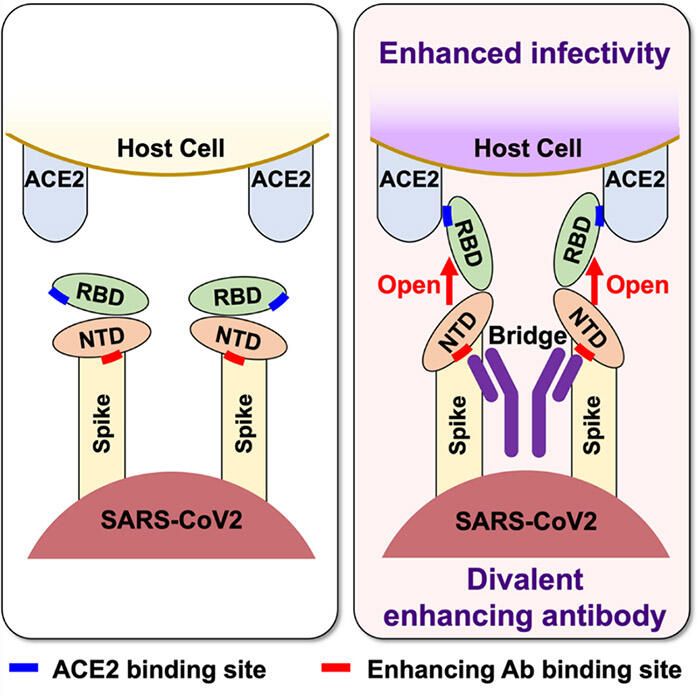A research group consisting of members from the Research Institute for Microbial Diseases, Institute for Protein Research, Immunology Frontier Research Center, Division of Infectious Disease, Graduate School of Medicine, and other organizations at Osaka University, led by Professor Hisashi Arase, has for the first time discovered that upon infection with the novel coronavirus, both antibodies that enhance infectiousness and neutralizing antibodies that protect against infection are produced. The results of the study were published in "Cell".
Dr. Arase said, "Infection-enhancing antibodies increase infectiousness by approximately three times, but because neutralizing antibodies being present in adequate amounts results in no problems in the host, current vaccinations should proceed as planned. When treating individuals with serum extracted from recovered individuals, it is necessary to use serum that contains sufficient neutralizing antibodies and relatively less infection-enhancing antibodies." Antibodies play an important role in protecting against viral infections. However, some antibodies are known to exacerbate infections. This phenomenon is known as antibody-dependent enhancement of infection (ADE). For example, once an individual is infected with dengue virus, infection with different types of dengue virus could be exacerbated by antibodies, which are produced as by-products of the initial infection. ADE has been thought to be caused by an Fc receptor-mediated system.
To clarify the function of antibodies produced in patients with COVID-19, the research group analyzed in detail the function of antibodies produced in response to 76 types of spike proteins cloned from patient immune cells.
As a result, it became clear that certain antibodies enhance infectiousness just by binding to virus particles. These antibodies are quite different from those previously known to participate in Fc receptor-mediated antibody-dependent enhancement of infection. The spike protein is a trimer and is composed of the S1 and S2 regions, and the S1 region is further divided into the Receptor Binding Domain (RBD) and N-Terminal Domain (NTD). Among the various types of antibodies, neutralizing antibodies act on the RBD to inhibit the binding of spike proteins to ACE2. However, six of the antibody types that bind to the NTD were found to be infection-enhancing antibodies that enhance binding to ACE2.

Credit: Osaka University
For spike proteins to bind to ACE2 receptors, the RBD must have an open conformation. The infection-enhancing antibodies identified in this study facilitated the open structure of the RBD by binding to the NTD and cross-linking two spike proteins. Professor Arase said, "This may increase the susceptibility of an individual to infection by approximately three times." Professor Arase and colleagues developed a specific method for detecting infection-enhancing antibodies. Using this technique, they measured the levels of infection-enhancing and neutralizing antibodies in patients with COVID-19 and analyzed the differences. The results of this analysis showed that infection-enhancing antibody levels tended to be higher in critically ill patients. In addition, it was proven that some people that have not been infected with the novel coronavirus possess infection-enhancing antibodies. In the future, by analyzing the production of infection-enhancing antibodies, it may be possible to test the propensity of individuals for serious disease. These findings also provide important implications for the development of vaccines that do not induce the production of infection-enhancing antibodies.
This article has been translated by JST with permission from The Science News Ltd.(https://sci-news.co.jp/). Unauthorized reproduction of the article and photographs is prohibited.




